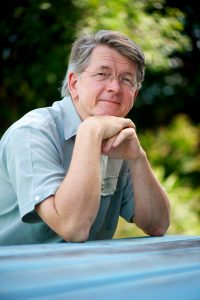Latest in forest science to be showcased in Brazil
IUFRO Spotlight issues up to September 2019 will primarily focus on the XXV IUFRO World Congress that will take place on 29 September – 5 October 2019 in Curitiba, Brazil.
Individual Congress sessions will be highlighted in order to draw attention to the broader Congress themes, the wide variety of topics that will be addressed at the Congress and their importance on a regional and global scale.
Visit the Congress website at http://iufro2019.com/ or https://www.iufro.org/events/congresses/2019/.
For the first Spotlight in this series we have invited Dr. Jerry Vanclay, Chair of the IUFRO World Congress Scientific Committee, to offer a sneak peak of the attractive and comprehensive technical program and talk about his personal expectations of the Congress.
————————–

Dr. Jerry Vanclay, Chair of the IUFRO 2019 World Congress Scientific Committee (COC). Photo courtesy of Southern Cross University (SCU), Australia
From Sept. 29-Oct. 5, Curitiba, Brazil, will be the site of the IUFRO 25th World Congress. These congresses have been held at approximately five-year intervals for the past 127 years.
“The World Congress differs from the usual 100-odd IUFRO scientific conferences held every year. In those, scientists in a given field will gather and discuss challenges, advances and solutions, in their specific area of expertise,” said Dr. Jerry Vanclay of Southern Cross University (SCU), Australia.
On the other hand, a “World Congress aims to maximize interdisciplinary interaction and to create opportunities for scientists to interact with others with similar interests beyond their usual network,” he said.
Dr. Vanclay, in addition to being Professor of Sustainable Forestry in the School of Environment, Science and Engineering at SCU, has several roles in IUFRO, one of which is Deputy Coordinator of IUFRO Division 4 Forest Assessment, Modelling and Management, as well as chairing the Scientific Committee for the Curitiba Congress.
As the scientific chair he expects to see a “comprehensive overview of the state of our science in all aspects of forestry” at the Congress. “In addition to updates from researchers, we’ll have a series of plenary sessions that will take the form of a dialogue between global science and policy leaders,” he said.
The five Congress themes – Forests for People; Forests and Climate Change; Forests and Forest Products for a Greener Future; Biodiversity, Ecosystem Services and Biological Invasions; and Forests, Soil and Water Interactions – are IUFRO’s key research themes.
They cover topical issues for forest research and management, Dr. Vanclay said, and are part of the 2015-19 strategy to guide science collaboration within IUFRO.
“That’s the whole point of the Congress; to help us all get updated with the latest developments and insights in all aspects of forestry in all the themes and disciplinary Divisions, he said.
“I’m aware of exciting progress within each of the themes and in several of the Divisions. And, I’m sure there are plenty of noteworthy developments, of which I’m currently unaware, that I’ll discover during the Congress. At this stage I’ve seen only abstracts, not full presentations – but many of these look quite compelling.
“I expect every Congress participant will come across advancements within his or her own field that are extremely intriguing,” Dr. Vanclay said.
As an example, he noted that much of his research has dealt with resource assessment, “so I’m impressed with recent progress in drone-based remote sensing and the way they have changed the amount, cost and timeliness of forest resource information.
“Drones,” Dr. Vanclay said, “have become consumer items, so they’re smaller, cheaper, easier to use, and have better range and collision avoidance. And sensors have become better and smaller.
“Collectively, they’re just another example of how our tools get better all the time, in every field – and our challenge remains to use them effectively and efficiently to get the best information and insights.
“And,” he added, “I’m sure there are comparable advancements (and challenges) in every field. Every Congress participant will find fascination within his or her own area of interest and we’ll arrange the program to enable people to select what is relevant to them.”
He said he personally considers climate change of particular importance, especially the challenge of motivating politicians and implementing effective policy.
Elaborating on that thought, he noted that there has been good progress within all theme areas since the last World Congress in 2014. “So any concern I have about lack of progress is not aimed at a particular theme, but is more general: namely the translation of scientific findings into effective policy, especially with regard to climate change.
“There is no quick fix for that challenge. We need to continue to present the best science in accessible language and engage with policy makers and with the political process,” he said. “One of our plenary sessions at the Congress continues with this important process.”
As to an overall result for the Congress, he said: “If we do this well – if people enjoy the Congress, learn from the formal sessions, and foster new friendships that lead to mentoring and research collaborations – the Congress will deliver benefits for decades.”
See you at the IUFRO 2019 World Congress!
Visit http://iufro2019.com/ * Look out for #IUFRO2019 on Twitter and @iufro2019 on Facebook!
IUFRO Spotlight is an initiative of the International Union of Forest Research Organizations. Its aim is to introduce, in a timely fashion, significant findings in forest research from IUFRO officeholders and member organizations to a worldwide network of decision makers, policy makers and researchers.
View all IUFRO Spotlights at http://www.iufro.org/media/iufro-spotlights/

Leave a Reply